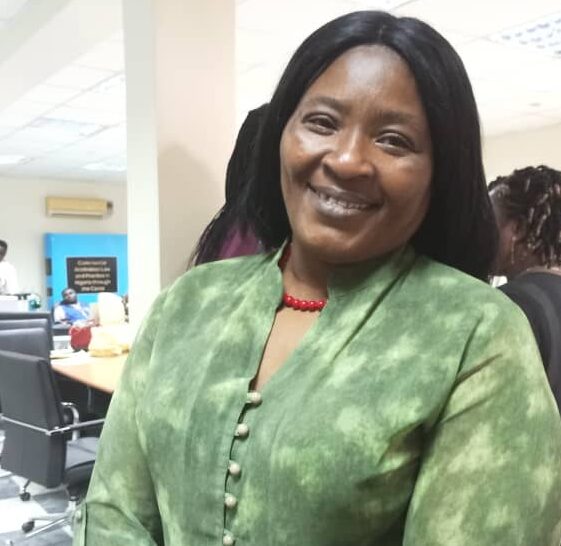By Kenneth Jukpor

Mrs. Rollens Macfoy is the new President of WIMA-Nigeria, the national chapter of African Women in Maritime (WIMAFRICA). Prior to her emergence as WIMA-Nigeria President, she had this exclusive interview with MMS Plus newspaper on the sidelines at the Nigeria International Maritime Summit (NIMS) in Lagos.
Macfoy, who is also the Managing Director of OceanDeep Services Limited, speaks on her aspirations for the association as President, even as she expounds the challenges confronting seafarers under the COVID-19 era and the loopholes that the regulatory agencies have failed to cover amid their professed regard and respect for seafarers.

Excerpts:
Having been in the maritime industry for several years, what would be your topmost priorities as President of WIMA-Nigeria?

My number goal is to have more women involvement across the maritime sector. I want to appeal to the federal government and other stakeholders, especially those in the private sector to create a quota for women in all companies and ensure that at the managerial level there is a minimum of 40 percent female representation.

If this can be achieved, I think we are close to equilibrium. This idea isn’t just for government agencies alone. We should be able to achieve this at private companies in the maritime sector. Manning agents, ship owners, freight forwarders and all aspects of maritime business should have this agenda in their administration as long as they are involved in maritime. Attaining an average of 40 percent representation on the management team across board will be a good development.
One big issue that affects seafarers is the lack of opportunities for seatime experience. As a manning agent, what suggestions would you proffer to address this problem?
In my opinion, the solution to this problem has been re-echoed by several stakeholders on numerous occasions. Nigeria should figure out a way to compel all the ships that do business on the nation’s waters to take a minimum of two Nigerians onboard their vessels.
This approach shouldn’t only be utilized for seatime but also explored for permanent employment. Irrespective of the flags the ships are flying or the nationality of the ship-owner, as long as those vessels are operational in Nigeria; they should be made to carry out cadets or train our seafarers. This should be mandatory. Every vessel should be able to take a minimum of two cadets at a time, one Engineer and one deck officer. I don’t see why any vessel operating in Nigeria should have a problem complying with this.
Nigeria wouldn’t attain the lofty goal of becoming a major supplier of competent seafarers if this isn’t applied and it can only be implemented by the Nigerian Maritime Administration and Safety Agency (NIMASA) with the support of the Federal Ministry of Transportation.
The vessels in Nigeria at the moment can carry 3,000 cadets at once if they take two cadets. All the vessels plying Nigerian waters at the moment can achieve this, and this includes drilling vessels because the experience onboard such vessels qualify as seatime. So, the challenge is to fine-tune the framework to make this a reality and implement it via the NIMASA and the Transportation Ministry.
If this approach is introduced and implemented, in five years Nigeria would be singing completely different songs with regards to seafarers’ development and availability of competent seafarers.
As someone who works closely with seafarers, how would you rate the new challenges since the outbreak of the COVID-19 pandemic last year, especially those in Nigeria?
We have seen how important seafarers are to the sustainability of global trade and the International Maritime Organization (IMO) has reiterated this by dedicating the World Maritime Day themes for 2020 and 2021 to highlight the place of seafarers.
However, considering the importance of seafarers who are the heartbeat of any nation, I expected that in Nigeria, NIMASA would pick a hospital and dedicate it to seafarers to enable them to do COVID-19 test free before going onboard. If that wasn’t possible, an arrangement should have been done that would see the seafarers only pay a token because the nation is passionate about seafarers.
It is important to ensure that these professionals are medically fit because some of them roam about from one hospital to another, suffering more traumas in a bid to get COVID-19 tests.
I expected that the passion that Nigeria says it has for the seafarers should have been displayed with such a programme. It’s unfortunate that there aren’t specific programmes or arrangements to show the much publicized regard we have for seafarers, especially with the advent of COVID-19 pandemic.
How much are seafarers paying to do these mandatory COVID-19 tests? Is there a discounted arrangement? Do we have a special committee to oversee their welfare onboard vessels? Who interviews Manning agents and Ship-owners on their obligations to seafarers? Who has contact with the seafarers to know how well they are faring and what the problems are?
If one or two vessels have had a case of COVID-19 outbreak, is NIMASA aware? Which other agencies are responsible, what was done about the situation? These are the things that should show that we are truly passionate about seafarers and their welfare. These people put their lives on the line, leaving behind their fathers, mothers, children, spouses and friends to be at sea to get goods from one part of the world to another. It would be very comforting to know that their efforts are appreciated and their welfare is prioritized.
At the 2021 World Maritime Day celebration in Lagos, the Minister of Translation, Hon. Rotimi Amaechi revealed stats highlighting that over 7,000 seafarers have been trained since the Nigerian Seafarers Development Programme (NSDP) was introduced. What impact has the maritime sector gotten from this programme focused on training the maritime workforce?
Out of the 7,000 that have been trained under this Programme, how many have been employed? How many are currently engaged onboard vessels in Nigeria? How many have probably been exported?
Answers to these questions would determine the success or otherwise of the NSDP initiative.
 MMS PLUS NG – Maritime, Aviation, Business, Oil and Gas News Online Newspaper with coverage in Maritime, Oil and Gas, Aviation, Power and Energy as well as Financial News
MMS PLUS NG – Maritime, Aviation, Business, Oil and Gas News Online Newspaper with coverage in Maritime, Oil and Gas, Aviation, Power and Energy as well as Financial News









